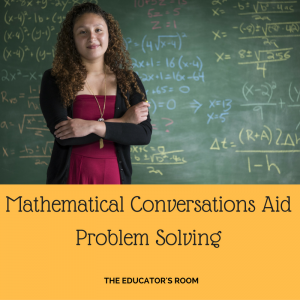Mathematical conversations are among the most important connections that make math about solving problems instead of just calculating answers. They include discussions of how a problem was solved and whether or not the answer makes sense. Often teachers shy away from mathematical conversations thinking they will lead to students talking instead of working. In this second article on math in the middle school, I am going to share the progression that I used to encourage meaningful mathematical conversations.
[fusion_builder_container hundred_percent=”yes” overflow=”visible”][fusion_builder_row][fusion_builder_column type=”1_1″ background_position=”left top” background_color=”” border_size=”” border_color=”” border_style=”solid” spacing=”yes” background_image=”” background_repeat=”no-repeat” padding=”” margin_top=”0px” margin_bottom=”0px” class=”” id=”” animation_type=”” animation_speed=”0.3″ animation_direction=”left” hide_on_mobile=”no” center_content=”no” min_height=”none”][bctt tweet=”Mathematical conversations are among the most important connections that make math about solving problems instead of just calculating answers. ” username=”EducatorsRoom”]
Beginning with Teacher Led Class Mathematical Conversations
I chose to move on to solving problems after teaching certain concepts. I would show a problem and ask the class how they thought we should begin. On occasion a few brave souls would make suggestions and we would try them. We would use the suggestion even if I knew it would not work. I found that seeing that mistakes can give students valuable information. When there was dead silence and I would go into my “think aloud” mode.
In “think aloud” mode I would begin talking about what I would do first if I had to solve this problem. The more sample problems we did like this the more likely students were to begin making suggestions. Once I regularly received suggestions I would stop offering ideas. At this point I would introduce the idea of having mathematical conversations in their teams.
Some of you may wonder how it is possible to keep students on track when working. The answer is to have a clear structure for your teams. I must admit that I did not always have successful teams when I first started using the idea. I became very good at team building after being trained to teach the Algebra 1 curriculum from CPM (College Preparatory Math). CPM has a method that works really well with all types of learners.
Structuring Teams for Mathematical Conversations
Each team has four members and each member has a job. The Facilitator begins by having the team work together. She chooses someone to read the task and when problem solving starts makes sure that all members understand the steps before moving on. The Task Manager keeps all members concentrating on the task and makes sure that no member is talking outside of the team. The Resource Manager is responsible for getting necessary supplies together to complete the work. This person is the one who gets help from the teacher if it becomes necessary. The Recorder/Reporter is responsible for being sure that the team has a written account of the solution and can explain the mathematical thinking for the solution to the class or teacher as necessary.
By now you are probably wondering what happens when no one in a team knows how to begin the problem. Should that happen the resource manager can request help from the teacher. The one thing to keep in mind if you are needed for this type of situation is that you should lead the team to the first step by asking them to explain what they know and what they have already tried. Usually at least one team member will have a suggestion on how to approach the problem and that is the time when you let the team work on their own. This leaves you free to “eavesdrop” on discussions in other teams.
In my experience with this procedure, some of the least likely students are the ones who come up with some of the most unique suggestions after becoming comfortable in their team. I can also say that I had a lot of fun when groups would share a method that had never occurred to me.
Have you ever had success with group problem-solving? Please let me know in the comments.
[/fusion_builder_column][/fusion_builder_row][/fusion_builder_container]







